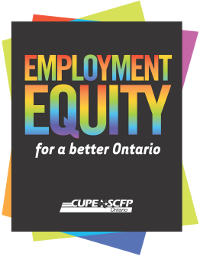Please Click Here to find recent news, events and information from CUPE Ontario.
 TORONTO, ON – Ontario’s diverse population is one of its great strength, but that diversity is not represented in workplaces. Because governments are doing nothing to create fair and just workplaces, the province’s largest union this morning announced it is taking matters into its own hands.
TORONTO, ON – Ontario’s diverse population is one of its great strength, but that diversity is not represented in workplaces. Because governments are doing nothing to create fair and just workplaces, the province’s largest union this morning announced it is taking matters into its own hands.
At the opening of its Human Rights Conference in Toronto, the Ontario division of the Canadian Union of Public Employees (CUPE) today introduced its new Employment Equity campaign.
“Employment equity, at its very heart, is about fairness and justice. These are values we hold dear. I would say they are values that are Canadian values,” said Fred Hahn, President of CUPE Ontario. “Governments have dropped the ball and refuse to address equity issues, so we as a union will use collective bargaining to ensure that we bargain for employment equity in our workplaces.”
The campaign has three major components. The first involves member education to dispel myths and build awareness about employment equity. The campaign will then help union locals bring employment equity to the table during collective bargaining. And it will involve studying representation within the union itself in order to address any shortcomings and to lead by example.
CUPE Ontario’s equity campaign will look at barriers to employment and advancement in the workplace and to involvement at all levels within the union.
“There are huge wage gaps in Canada. The median income of First Nations, Metis and Inuit people is $11,000 a year lower than the Canadian average, and the wage gap has not been improving,” said Joanne Webb, the union’s Diversity Vice-President for First Nations.
Women still make less than men, and people with disabilities have twice the national average rate of unemployment, she said.
Because equity-seeking groups fill more low-paying, low-status jobs than senior positions, government job cuts will mean a sharp increase in wage gaps and a worsening of representation in workplaces. The 2300 jobs lost in Toronto, for example, will be front-line workers such as the cleaning staff who were already outsourced. Thousands of job cuts from Queen’s Park will only make the situation worse, Webb said.
“We have been waiting a long time for employment equity. It is simply unacceptable that in Canada racialized workers still make up more than 40 percent of workers in sewing and textiles and 36 percent of taxi and limo drivers, but only 3 percent of executives,” said Veriline Howe, the union’s Diversity Vice-President for Racialized Workers.
Howe added that it is even more important to ensure people truly have equal opportunities as population growth is driven increasingly by non-European immigration. Because many new jobs are part-time or casual, earning a decent living is increasingly difficult for marginalized workers.
“As a union, we believe in equality, and we need to do more to make equality a reality,” she said.
CUPE Ontario’s campaign launch comes on the heels of a similar campaign launched by Colour of Poverty, a network of social change organizations. Colour of Poverty issued a statement for the launch of CUPE’s campaign, and that statement and a video of the launch are available at www.cupe.on.ca.
-30-
For more information, please contact:
Craig Saunders, CUPE Communications, 416-576-7316
Video: CUPE Ontario Employment Equity Campaign Launch
